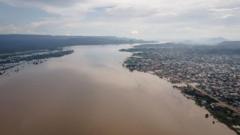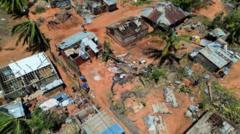At least 54 individuals have been confirmed dead following the capsizing of an overpacked boat on Nigeria's River Niger, which may have been carrying more than 200 passengers. The incident occurred early Friday and has led to the rescue of 24 survivors, with many still receiving treatment in local hospitals. Efforts by divers to search the waters for additional survivors are ongoing, but hope is diminishing as time passes. This unfortunate event is a stark reminder of the frequent boat accidents that plague Nigeria's waterways, often attributed to lax enforcement of safety regulations.
Tragedy Strikes as Boat Capsizes on River Niger, Leaving Over 50 Dead

Tragedy Strikes as Boat Capsizes on River Niger, Leaving Over 50 Dead
More than 50 bodies recovered after a tragic boat accident on Nigeria's River Niger raises urgent questions about safety regulations.
The boat was en route from Kogi state to a marketplace in Niger state when it sank, with many aboard likely being market traders and day laborers. Initial investigations suggest that numerous passengers may not have worn safety life jackets, violating safety protocols. Compounding the tragedy is the lack of official passenger manifests, making it exceptionally challenging to ascertain the full extent of the casualties or the identities of the missing.
Justin Uche, head of the National Emergency Management Agency in Kogi state, emphasized the difficulties in documenting the incident due to the absence of record-keeping. In light of this tragedy, Kogi state Governor Usman Ododo has mandated healthcare facilities to provide comprehensive care to survivors, including nutritional support, while also calling for stricter enforcement of safety regulations to avert similar occurrences in the future. This latest disaster marks the third significant boating accident in Nigeria in the past two months, underscoring systemic issues in maritime safety management.
As calls for improvements in safety measures grow stronger, the nation grapples with the impact of inefficient transportation infrastructure on public safety.
Justin Uche, head of the National Emergency Management Agency in Kogi state, emphasized the difficulties in documenting the incident due to the absence of record-keeping. In light of this tragedy, Kogi state Governor Usman Ododo has mandated healthcare facilities to provide comprehensive care to survivors, including nutritional support, while also calling for stricter enforcement of safety regulations to avert similar occurrences in the future. This latest disaster marks the third significant boating accident in Nigeria in the past two months, underscoring systemic issues in maritime safety management.
As calls for improvements in safety measures grow stronger, the nation grapples with the impact of inefficient transportation infrastructure on public safety.




















